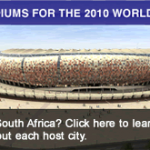
South Africa brimmed with pride and anticipation on Thursday on the eve of the first World Cup on African soil as the nation’s icon Nelson Mandela said the tournament would bridge racial divides.
While the last of the 32 competing teams flew in, the Rainbow Nation was caught up in a wave of euphoria not seen since the demise of the whites-only apartheid regime and Mandela’s election 16 years ago.
As blasts of the ear-splitting vuvuzela horns echoed around town, flag sellers who set up stalls by traffic lights struggled to keep pace with demand and even police officers wore jackets in South Africa’s national colours.
After tens of thousands took to the streets of Johannesburg on Wednesday to cheer on the Bafana Bafana (the Boys) national side in an open-top bus, it was the turn of Cape Town to join the party with a street festival in the city centre.
The front-page of the Citizen proclaimed “Bafana Mania!” while an editorial in the same paper said the outbreak of patriotism in a country which is still struggling to bridge a racial divide can only be a force for good.
“For one brief shining moment we can forget the problems that beset the country and hopefully build on the enthusiasm and patriotism sweeping the land,” it said.
In the Star newspaper even the cookery pages were caught up in the excitement, including a recipe for chocolate brownies with tequila sauce in a nod to South Africa’s challengers on Friday.
“South Africans are late believers but once they believe, they are fanatical believers,” said Danny Jordaan, the chief executive of the local organising committee, at a final pre-tournament session with reporters.
As international artists such as Shakira, the Black Eyed Peas and Alicia Keyes prepared to take to the stage at the historic Orlando stadium in Soweto, the township’s most famous ex-resident welcomed a new chance to combat prejudice.
“The 2010 World Cup is more than just a simple game,” Mandela, the country’s first black president, said in a message to football’s governing body FIFA.
“It symbolises the power of football to bring people together regardless of their language, colour of their skin, their politics or religion.”
Ever since it became the first African nation to win the right to stage the tournament six years ago, South Africa has had to fend off claims that its high crime rate, lack of infrastructure and rudimentary public transport system rendered it an unsuitable choice.
Work at all the 10 host stadiums has been completed on time while a series of signature World Cup infrastructure projects are also up and running, including Africa’s first high-speed rail link.
But the spectre of crime continued to stalk visitors, with a Chinese television crew among the latest victims to be robbed at gunpoint.
“We appeal to citizens and visitors to also exercise care of their personal safety and those around them,” government spokesman Themba Maseko said in a statement.
Some 300,000 foreign fans are expected in South Africa during the tournament. Organisers said that the VIP guests including US Vice President Joe Biden, United Nations Secretary General Ban Ki-moon and Mexican President Felipe Calderon would be among the crowds at Friday’s opener.
Thursday night’s concert at Orlando stadium begins at 8:00 pm (1800 GMT), with tens of millions of people expected to watch on television.
The venue is home to the Orlando Pirates, one of the oldest South African football teams who became a sporting symbol of the fight against apartheid.
One of the bloodiest episodes of the 1976 Soweto uprising came when police opened fire at a crowd of thousands who were marching towards the stadium in protest at a new law enforcing local schoolchildren to learn Afrikaans.
0 Replies to “World Cup Begins In South Africa”